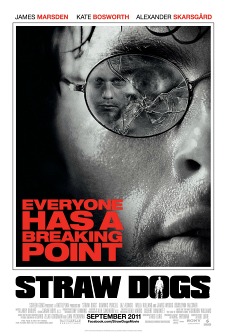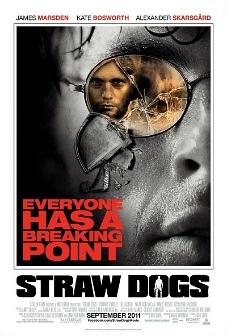Month: July 2011
Simmons on Theron, Young Adult
On 7.6 Bill Simmons said during an ESPN B.S. report with Chris Connelly that he’d caught a screening of Jason Reitman‘s Young Adult, which he says will open in December. Simmons said he thinks “it’s tremendous, and here’s what I really liked about it, other than the fact that it was just well done.

“Remember when we said earlier about Tom Cruise being Tom Cruise and how he needed Jerry Maguire [to do that], and how you watched for two hours…? This is Tom Cruise throwing 98 miles an hour. Charlize Theron has never had a movie like that. Monster shoudn’t be her defining movie…she gained 35 pounds and made herself ugly [for that], and she’s beautiful. She’s never had a really good movie that she was really good in in which she was also beautiful.
“And it made me reevaluate her career…that’s how good I thought she was in it. She knows that you know that she knows she’s beautiful. I’m glad she made this movie. People will feel differently about her after they see it.”
Mormon Sex In Chains
I had a brief chat yesterday afternoon with Tabloid director Errol Morris. Very brief. The principal topic was Joyce McKinney, who kidnapped a young Mormon guy she was in love with named Kirk Anderson in 1977 England, and chained him to a bed and had sex with him. Morris’s bemusing doc is a portrait of love, passion and never-say-die determination, among other things.
I reviewed Tabloid at last September’s Toronto Film festival. Here’s part of what I said:
“Who in Errol Morris’s Tabloid can you believe? Or rather, who do you want to believe? Or what slant on the Tabloid story do you feel better about accepting as probable truth? That’s the key consideration, I think. Apart from the fact that everyone should try to see this deliciously entertaining study of a spirited blonde wackazoid who lives on her own, self-created planet.
“I love that Morris almost ignores and certainly doesn’t emphasize the bottom-line motivational truth about the still-kickin’, real-life star of Tabloid.
“This blonde, once-fetching Wyoming gal with a very high IQ became cheaply famous for following her big-lug Mormon boyfriend Kirk Anderson (whom she expected would soon be her husband) to England in ’77 after he ‘disappeared’ (i.e., had been squired away by Mormon church control-freaks) and took him to a country cabin (apparently without much resistance on the big dope’s part) and had some kind of bondage-type sex with this bespectacled, guilt-ridden Mormon Baby Huey (whom you could also describe as a METAPHORICAL-DIAPER-WEARING DOUCHE) for three days.
“Joyce wound up becoming a huge media-sensation after London’s tabloid newspapers began reporting about the blonde hussy and ex-beauty-queen kidnapper and her ‘manacled Mormon.’
“The ironical bottom line is that while Joyce began her young adult life as a girl who wanted to meet a ‘special’ guy and live in a nice cozy house and raise kids, what she really wanted deep down was to be a dominatrix. She didn’t want a husband — she wanted a good dog.
“And so she became famous for tying up Anderson (who’s the size of Gort in The Day The Earth Stood Still, and who has the body of an out-of-shape Sumo wrestler) and having her way with him for 72 hours. And then for her past life as a prostitute-dominatrix in Los Angeles (exposed by London’s Daily Mirror) before the whole Kirk episode occured. And then for having her dog — an actual four-legged one — cloned by some South Korean geneticists.”
Slow News Day
Imagine the journalistic standards and criteria that led the Los Angeles Times to go with a front-page banner headline on May 12, 1958 about Peter Lawford, then a 34 year-old moderately famous TV actor (The Thin Man), having possibly fractured his arm in an auto accident on Sunset Blvd. And I mean especially considering that Lawford wasn’t even hospitalized but “went to his personal physician for treatment.”
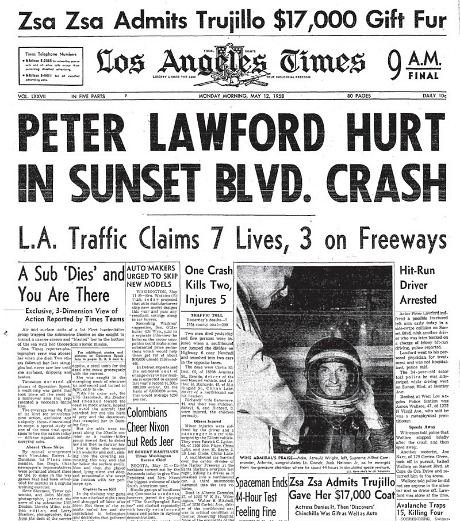
Imagine the newsroom conversation between the front-page, straight-news editor and entertainment reporter who covered the Lawford accident.
Entertainment reporter: “I’ve got something that might be a page-one headline…you tell me. Peter Lawford was sideswiped by some guy on Sunset and might have fractured his arm.”
News editor: “Good God, Peter Lawford’s been hurt? I watch The Thin Man every week. Is he okay?”
Entertainment reporter: “Yeah, he’s all right. Arm’s in a cast but he’s fine.”
News editor: “But he was…what, run over?”
Entertainment reporter: “No, his car was hit and the impact…”
News editor: “Oh, right…”
Entertainment reporter: “His car was hit by this other guy who fled the scene, and Lawford’s arm was hurt.”
News editor: “Well, we have to send flowers or something. What hospital is he in?”
Entertainment reporter: “He’s not in a hospital. We went to his doctor and had a cast put on and went home.”
News editor: “So he’s okay. So…wait a minute, I don’t get this. Why is this a page-one headline?”
Entertainment reporter: “Maybe it isn’t. I’m just saying Lawford got hurt and he’s….he was MGM’s biggest star in the mid to late ’40s and…okay, he’s doing TV now but he hangs out with Frank Sinatra and is married to the sister of Senator Kennedy from Massachucetts, who might run for president so…we might want to give it some play.”
News editor: “But he didn’t even go to the hospital!”
News editor: “I know, it wasn’t that bad, but…I’m just telling you what happened. If it’s not big enough, fine. We’ll stick it in the movie section.”
News editor: “Let me think it over.”

Kick It Around
Yesterday morning In Contention‘s Kris Tapley and Indiewire columnist Anne Thompson briefly revived their Oscar Talk podcast. But it was just a one-off. They announce at the conclusion that they’re going on hiatus again and will return on 8.26.
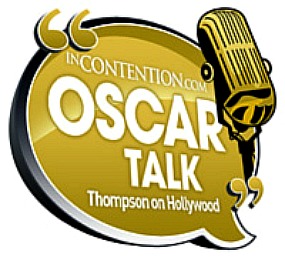
Tapley and Thompson share some intriguing calls here and there. But Thompson, in my judgment, passes along what feels like contradictory sentiments.
Early on Tapley asks Thompson about the Best Picture and/or Oscar-nomination potential for Terrence Malick‘s The Tree of Life. Thompson mulls it over, hesitates, decides what to say. “I have to tell you that I’m assuming….that Terrence Malick is taken seriously by many of the crafts people in the Academy,” she finally says. “Because [The Tree of Life] is a work of considerable achievement…it’s very hard to call, very hard to tell…[but] the Academy will recognize the craftmanship involved.”
In other words, The Tree of LIfe hasn’t a snowball’s chance in hell of being Best Picture nominated.
Fox Searchlight will presumably push for this honor, and in a better world a movie that swirls around so imaginatively in the oceans of the past and present, like Life, deserves industry-wide praise. But Malick doesn’t make “Academy movies” and he’s never kowtowed to or schmoozed with the Academy membership, so forget it. Especially with mainstream boomer critics like Kenneth Turan and Marshall Fine being foursquare against his latest. The Tree of Life might have a shot at a Best Picture nomination if the ten-nomination standard was still in effect, but with the current system? No way.
The contradiction, it seems to me, comes when Thompson applauds the Academy’s recent Best Picture rule change, which declared that for a film to be Best Picture nominated 5% of Academy membership must put it at the top of their nomination list. She says she’s “thrilled” with this new rule because the ten-nominee experiment of ’09 and ’10 was “a big mistake” because “Academy members were stretching to fill in those ten slots and putting in movies they didn’t love.”
The 10-nomination idea, of course, was to offer some seasonal nomination love to the widely admired also-rans (indie quality faves plus popular audience pics like The Dark Knight) that didn’t have a serious chance of winning. It was an equation that a mentally-challenged person could comprehend — five nominations for movies that members genuinely love, and five nominations for movies they seriously like. How difficult is that? At the end of every year I compose a list of excellent, very good and very respectable achievers, and it always comes to at least 20 if not 25 films. And Academy members couldn’t think of ten?
Thompson acknowledges that it’ll now be “tougher for independent films to get into the top five…consensus and mainstream titles will win the day.” And she’s “thrilled” with that? Yet she’s reluctant to call a spade a spade by declaring that The Tree of Life is exactly the kind of film that is out of the Best Picture race because of the new rules.
Tapley ask Thompson if Super 8 is an Oscar contender? What? Super 8 is a highly enjoyable, quality-calibre, Spielberg-referencing summer monster flick that was never expected to compete in this realm. And yet they go on and on. Tapley: “Could it get nominated?” Thompson: “I don’t think for Best Picture.” And yaddah yaddah.
Thompson also calls it “the ultimate boomer movie” No — Super 8 is the ultimate GenX movie. Apart from those who enjoy the revisiting-the-Spielberg-glory-days aspect, it’s primarily connecting with people who were tweeners and teens and early-college age in the late ’70s or early ’80s…people in their early to late 40s. Only the youngest boomers (a.k.a., the generational tweeners born between boomer and Genx, like President Obama) fit this demo. Most boomers started popping out in ’46 and throughout the ’50s, and are mostly aged 50 to 65.
Tapley asks about Lars von Trier‘s Melancholia, which Thompson calls her “favorite film at Cannes,” and whether Kirsten Dunst, winner of that festival’s Best Actress award, will get any awards action. Short answer: Nope — Von Trier killed Academy interest with his flippant Nazi remarks.
Right after the Melancholia discussion Tapley says that “we’ve got ComicCon coming” in a week and a half and Thompson replies, “From the sublime to the ridiculous!” Good one.
Jason Reitman‘s Young Adult is mentioned, and I don’t agree with their downbeat “uh-oh” tone. Tapley: “I’ve heard Margot at the Wedding comparisons.” (So have I.) Thompson: “That’s not good.” Tapley: “[Charlize Theron is playing] a character you don’t necessarily empathize with like characters in [Reitman’s] other films.”
Wait a minute — a troubled, somewhat curmudgeonly but (to go by the Diablo Cody script I read) highly unusual and interesting female character is “not good”? Why is that? Why can’t we sink into characters who are a little bit thornier than the usual-usual? Isn’t life-reflecting honesty what finally matters in a film? Shouldn’t our ultimate criteria be the quality of writing and directing and acting?
Horse Suffers, Music Swells
All you need to know about Steven Spielberg‘s War Horse is in this two-minute clip of John Williams‘ score. Gentle, quiet and fluttery. Perhaps a score with a bit less of that Spielberg + Williams emotional chain-pulling we’ve all known over the last 30 years? And then the French horns kicked in, and I knew for sure that this film will be shovelling it big-time.
Williams’ theme suggests pride, heart, struggle, conviction. More to the point, the use of French horns is movie-score shorthand that informs the audience of the following: “Something touching and stirring and triumphant is happening, so it’s time to let those suppressed tears well up and fall down your cheek. Rest assured our film is destined to move you in profound, Oscar-baity ways.”
Don't Golly-Gee-Gosh Me
The best interviews in which both participants are filmmakers (or significant contributors to films) are those in which (a) there’s a very slight vibe of contention or aesthetic disagreement between them, such as the famous Steven Soderbergh-Lem Dobbs commentary on the Limey DVD, or (b) the interviewer admires the interviewee but not to a degree that he’s unable or unwilling to ask serious probing questions, like Soderbergh interviewing Mike Nichols on the Catch 22 DVD.
No offense, but the worst kind happen when the interviewer is obsequious and possibly favor-seeking, or is at least looking to avoid any question or remark that might persuade the subject not to hire him down the road.
This interview between JJ Abrams (Super 8, Star Trek, MI3) and composer Michael Giacchino (Lost, Up, The Incredibles, Star Trek, Let Me In) happened on June 12th at the Hammer Museum. Almost a month ago, and it’s only just now being posted? Lazy.
Clean, Shaven
Even the notoriously scowly, Resurrecting The Champ-hating Devin Faraci has to admit that this new Straw Dogs poster is an improvement over the previous attempt, which was revealed on 6.14. I didn’t have a big problem with version #1 because it basically replicated the original 1971 poster while adding a slogan (which I could have done without) and a small insert of the face of Alexander Skarsgard, who plays James Marsden‘s nemesis, within the broken glasses.
But the new version is better, I’m now realizing, because it (a) removes the amber color element inside the shattered lens, (b) makes Skarsgard into a much more subtle (and therefore creepier) presence while adding Marsden’s openly glaring eye, which was absent in version #1, and (c) gets rid of the chunks of broken glass that were previously stuck to Marsden’s cheek (and which were also stuck to Dustin Hoffman’s cheek in the original).
Good Shepherds
About 10 months ago I wrote that “the highest calling of a Hollywood columnist during awards season is to be a strong and impassioned shepherd and show the sheep where the good grass is. Not to imply sheep don’t have a nose for good grass on their own. Of course they do. But there is crabgrass, grass, decent grass, better grass, higher-quality grass and world-class gourmet grass, and I would humbly submit that committed shepherds have a special eye and an attuned nose for good grass…that’s all.
“Put another way, the Oscar-season columnists who say ‘I’m just taking the pulse of the town and staying out of the argument’ are like Judean shepherds on a hillside near Mount Sinai. Shepherd #1: “Look at those sheep over there, eating all that yellow grass and those weeds.” Shepherd #2: “Yeah, I know, and with that really nice looking patch of rich green grass to the left about 100 yards.” Shepherd #1: “Why don’t we get our staffs and scoot them over in that direction?” Shepherd #2: “No, no, that’s not our proper role. We’re here to just chill and observe and keep an eye on whatever the sheep are up to…nothing more.”
Bend With It
Every time I visit a convenience store I start looking around for those clear rounded plastic jars containing cheap black combs. I’m referring to ones made out of slim and bendable plastic with thin, malleable teeth that go for only 99 cents, and not the stiff and unyielding slightly heavier kind with overly dense teeth that drugstores sell for $3.50 or $4. Only down-at-the-heels liquor stores sell cheapo combs. I refer to them as James Dean combs. They slightly bend with your hair and slip nicely into your back jean pocket without a feeling of excessive rigidity.

(l.) The “good” James Dean comb; (r.) the “bad” KMart/CVS comb.
I’m obviously coming from a highly fickle place, but I’m always on the look for cheapo combs and they’re disappearing from the marketplace, i fear. Can’t find them anywhere. The next time I see a batch I’m buying the whole supply.
The Blobs
The latest obesity statistics (released by the Robert Wood Johnson Foundation and Trust for America’s Health) indicate that Americans are much heavier now than 15 years ago. There are now five states (Mississippi, Alabama, West Virginia, Tennessee and Louisiana) in which nearly one in three people are obese. And the state with the lowest 2011 obesity levels — Colorado, with 19.8 percent of adults considered analogous to walking sea lions — would have had the highest rate in 1995, the report says.
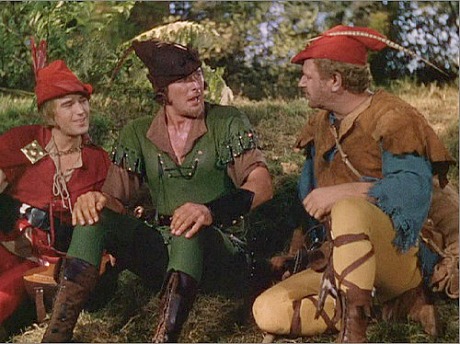
(l. to r.) Patrick Knowles, Errol Flynn, Alan Hale, Sr. in The Adventures of Robin Hood.
Think of that — every fifth person in the healthiest state in the nation has the physique of John Candy in Planes, Trains and Automobiles.
To get an idea of how things have changed over the last few decades, consider a light-hearted scene in Michael Curtiz‘s The Adventures of Robin Hood (1938) in which Alan Hale, Sr. (i.e., “Little John”) is repeatedly ribbed by Errol Flynn and his Merry Band of Men for being too heavy. They surround Hale and laugh and nudge him and really let him have it — your body is rather laughable, good fellow!
Except Hale’s Little John isn’t close to being fat by today’s standards. He has the physique of Seth Rogen before he lost weight for The Green Hornet. He’s definitely more svelte than Jack Black. Don’t even mention him in the same breath with pre-weight-loss, Get Him To The Greek Jonah Hill.

